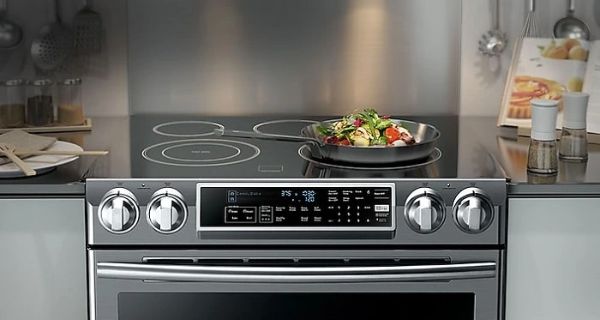When it comes to choosing a new range for your kitchen, the options can be overwhelming. Two popular choices are induction ranges and electric ranges. While both offer their own set of advantages, understanding the differences between them is crucial in making an informed decision.
In this blog post, we will explore the distinctions between induction ranges and electric ranges, highlighting their key features and helping you determine which one suits your cooking needs and lifestyle.
Table of Contents
Induction Range
- How It Works:
Induction ranges use electromagnetic technology to heat the cookware directly. When an induction-compatible pot or pan is placed on the cooktop, an electric current creates a magnetic field, generating heat within the cookware itself. This allows for precise and efficient cooking. - Cooking Speed and Efficiency:
Induction ranges are known for their exceptional speed and efficiency. They heat up significantly faster than electric ranges, reducing the time required to bring water to a boil or heat up pans. Additionally, induction cooking provides instant response and precise temperature control, allowing for greater flexibility in your cooking. - Safety:
One of the notable advantages of induction ranges is their safety features. Since the cooktop itself doesn’t generate heat, it remains relatively cool to the touch, reducing the risk of burns. Induction ranges also feature automatic shut-off functions, which turn off the heat if no cookware is detected or if the pot or pan is removed from the surface. - Energy Efficiency:
Induction ranges are highly energy efficient due to their direct heat transfer to the cookware. They waste less energy as heat escapes much less to the surrounding environment. This efficiency not only saves energy but also contributes to a cooler kitchen and lower utility bills.
Electric Range
- How It Works:
Electric ranges use heating elements located beneath the cooktop to generate heat. These elements, typically made of coiled metal or ceramic, heat up when electricity passes through them, transferring heat to the cookware. - Cost and Installation:
Electric ranges are generally more affordable compared to induction ranges. They are also easier to install, as they don’t require specialized electrical circuits like induction ranges do. - Cooking Versatility:
Electric ranges offer a wider range of cooking options, as they can accommodate various types of cookware, including non-magnetic materials. This versatility allows you to use any pot or pan you already own without worrying about compatibility. - Maintenance and Cleaning:
Electric ranges can be relatively easy to clean, as the smooth cooktop surface allows for straightforward wipe-downs. However, they are prone to stains and scratches, so caution is needed to maintain their appearance.
Induction Range vs. Electric Range
| Features | Induction Range | Electric Range |
|---|---|---|
| Cooking Speed and Efficiency | Faster heating, precise temperature control | Slower heating compared to induction ranges |
| Safety | Cooler to touch, automatic shut-off functions | Heat is generated on the cooktop |
| Energy Efficiency | Highly energy efficient, less wasted heat | Less energy efficient compared to induction ranges |
| Cookware Compatibility | Requires induction-compatible cookware | Can accommodate various types of cookware |
| Cost and Installation | Generally more expensive, requires specialized electrical circuits | More affordable, easier installation |
| Versatility | May have limitations on cookware selection | Can use any type of cookware |
| Maintenance and Cleaning | Easy to clean, no coils or burners to clean | Smooth cooktop surface, prone to stains and scratches |
Conclusion
When deciding between an induction range and an electric range, understanding the differences is essential to select the option that best suits your needs. Induction ranges offer faster cooking, precise temperature control, and enhanced safety features, making them an excellent choice for those seeking efficiency and convenience.
Electric ranges, on the other hand, provide affordability, versatility, and a wider range of cooking options. Consider your cooking style, preferences, budget, and available kitchen setup when making your decision. With the right choice, you can enjoy a range that enhances your cooking experience and meets your culinary requirements.

